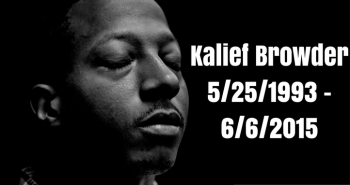Remembering Kalief Browder: The State of Youth in Adult Jails and Prisons Two-Years After Kalief Browder’s Death

By Jeree Thomas, Policy Director
Today, June 6, 2017, marks the two-year anniversary of the devastating loss of Kalief Browder. Kalief was a twenty-two year old whose traumatic and deeply unjust contact with the adult criminal justice system when he was only 16-years old changed the course of his life forever. If you are unfamiliar with his story, you can learn more about him in the six-part documentary, Time: The Kalief Browder Story, which aired on Spike Television this year. The documentary details Kalief’s upbringing, what led to him being held for 3-years in an adult jail, Rikers Island, without being convicted of a crime, and how the haunting experience ultimately led to his suicide.
Kalief’s experience has spurs state and national attention, conversation, and action. In his home state, New York, the legislature passed and the Governor signed into law on April 10, 2017, A3009c, a bill that will raise the age at which youth can be tried and treated as adults in the criminal justice system and remove youth from adult jails and prisons. In addition, Queens, New York Representative, Joe Crowley, announced the introduction of the Kalief Browder Re-Entry Success Act, federal legislation to strengthen mental health services for returning citizens after spending time incarcerated.
New York is not alone in its urgency to take action around youth being held in adult jails and prisons. In an effort to comply with the federal Prison Rape Elimination Act of 2003(PREA) Youthful Inmate Standard, which generally requires sight, sound, and physical separation of youth under 18 from adults in jails and prisons, several states have considered or passed legislation to hold youth who have been transferred to the adult system in juvenile facilities instead of adult facilities.
This year, Oregon’s legislature passed HB 2251 which prohibits the placement of youth under 18 in their adult Department of Corrections facilities. Over the last two years, Arizona (SB 1308), DC (B21-0683), Maryland (HB 618), Kansas (HB 2336), Washington (HB 1674) and Montana (HB 134) have also passed legislation that will help move youth under 18 from adult facilities or from Department of Corrections oversight. Within states, localities like New Orleans have passed city ordinances to remove youth from adult facilities. While each piece of legislation varies in how strongly it blocks the pathway of youth to adult jails and prisons, the amount of legislation shows positive momentum. This year, other states also put forward legislation to keep youth out of adult jails and prisons. While this legislation did not pass or has not passed yet, it highlights an interest in treating and holding youth as youth instead of as adults (South Carolina, H 3946 and S 156; South Dakota, SB 164; Connecticut, HB 7286; Nevada, AB 185 and Washington, SB 5613).
Unfortunately, these reforms come too late for Kalief Browder and a number of other youth who have taken their lives as a result of their time in adult jails and prisons. However, it is critical that legislatures, local policy makers, law enforcement officers, and communities not only reflect on the loss of these young people, but also take decisive action to protect youth from their fate moving forward.

